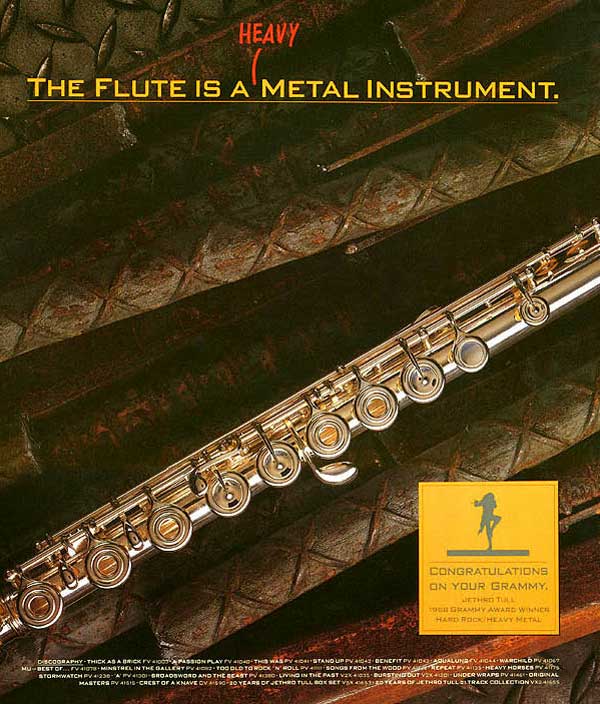
In 1989, in an attempt to show they were at least attempting to be ‘down with the kids’, the Grammys introduced a new category: Best Hard Rock/Heavy Metal Recording. All good so far.
However, on February 22, when Metallica, Iggy Pop, Jane’s Addiction and the year’s other major contenders in the new category showed up for the Grammy Awards ceremony at The Shrine in Los Angeles, none of them could possibly have expected that, when award presenter Alice Cooper opened the envelope and began “And the winner is…” the award for Best Hard Rock/Heavy Metal Recording of 1989 would go to a folksy, flute- fronted prog rock band: the decidedly non-metal, far from hard-rocking Jethro Tull.
Yes, you can laugh. Many there on the night certainly did.

Chris Wright (founder, Chrysalis Records, Tull’s label): 1989 was the first year of the Heavy Metal Grammy. Chrysalis Records in America was based in Los Angeles at that time, but I don’t think there was one single person in the company who thought, hang on a minute, Jethro Tull might win the Heavy Metal award. I don’t think we were even expecting it to be awarded live on the show.
Ian Anderson (leader, Jethro Tull): Perhaps because we were five nice men who had never won a Grammy before, the voting members of NARAS [National Academy of Recording Arts And Sciences] decided we should receive a nomination. It’s a peer group award from people in the industry – producers, musicians, record company professionals – who give the award; it’s not six panellists on The X Factor.
Lars Ulrich: Some three weeks before the awards, all those who are ‘in touch’ – the critics, the day-today involved people – assumed that Metallica would walk away with the award. It’s easy for the in-touch people to think that, but remember that most of the academy, who vote for the nominees, are in the age group of 40 to 60, and are very much less in tune with what goes on in the music scene.
C Michael Greene (Then President, NARAS): Grammy bashing is one of the easiest sports in the world.
Ian Anderson: The hot ticket was Metallica, in this newly introduced category of Hard Rock/ Metal. I was told by our record company, by the then-head of Chrysalis in the USA, not to bother going, which is a euphemism for: “We’re not going to pay your air fare or get you a hotel, because we don’t think you’re going to win.”
It was assumed that we would not win because we were up against Metallica and Iggy Pop and Jane’s Addiction. So we were definitely the odd ones out, because we were more commonly thought of as a folk rock band, certainly not hard rock or heavy metal.
Alice Cooper (Grammy Awards presenter): We went to the Shrine Auditorium for rehearsals that day, and that involved opening an envelope with a dummy card inside, which has a name on it. But it’s never the name of the real winner, it just gives you something to read out. I think, during rehearsal, the name on that card was Jethro Tull, so I read it out.
Later that night we’re doing the real thing, and we come to this brand new category, Hard Rock/Heavy Metal. I knew that [Tull’s album] Crest Of A Knave had been nominated, but everybody in that room was certain that Metallica would get the Grammy.
Lita Ford: I got to read out the nominations, and then it was Alice that opened the envelope. I remember he reached in his jacket pocket and, instead of pulling out the envelope, he pulled out a snake and handed it to me. Then I realised it was a rubber snake, so I threw it out into the audience while he was opening the envelope. Then they threw it back at me and I had to throw it out there again, which was really funny.
Alice Cooper: I opened the envelope, and when I saw the name, I thought they’d given me the envelope from the rehearsal. I looked at it again, and it did have a different seal on it and details like that. It was the real thing. So I said: “For the Best Hard Rock/Heavy Metal Grammy… Jethro Tull!”
Lita Ford: If you watch the video, you’ll see my eyes get real big when Alice says: “Jethro Tull”. I was trying not to show any emotion, but it was like, “What?!” It was a shock to everybody when Alice read out Jethro Tull’s name. Metallica were standing right there, all ready to go on, and they were sure in their heads that they’d got it.
Alice Cooper: There was a two-minute pause, then everybody broke out laughing. They thought I was doing a joke. I said: “No, I’m not kidding. Jethro Tull.” There was this huge sort of Springtime For Hitler gasp from the audience. Because the contenders were really well-known metal acts like Metallica and AC/DC.

Chris Wright: Crest Of A Knave, obviously, wasn’t a heavy metal record. There are very few Jethro Tull tracks that could ever even vaguely fit that description. Something like Locomotive Breath might be considered a heavy rock track, but you would never describe them as a heavy metal act.
Alice Cooper: Jethro Tull were not there, so I just accepted the award on their behalf. Ian Anderson: As a result, the poor unfortunate Alice was hailed by a torrent of abuse and boos and whistles and cat-calls, because the audience was pissed off that their darlings, Metallica, hadn’t won. It made me a bit angry that Alice had had to face that negative and nasty reaction. Actually, if I had been there I’d have loved it. If they had been booing and screeching at me it would have been such a fantastic moment for a one-line put-down.
Lita Ford: There were people in the hall who were upset, and there were people complaining backstage, saying: “How did that happen?” “Metallica should have got it!” “How come Jethro Tull got it?” I just tried to stay out of that.
Alice Cooper: I think what happened was that the old guys in the Grammy organisation who were voting didn’t really recognise any of the names except Jethro Tull. I don’t think they’d ever heard of Metallica, who were a pretty new band. Everybody who was in touch with modern rock knew who they were, and everybody was sure that Metallica would be the winner.
All the other nominees [in the category] were, like, monster metal. It was just the weirdest thing in the world. I could not believe it was right. In fact, at that time, Jethro Tull wasn’t really hard rock, they were prog rock.
C Michael Greene: We ended up with a pretty bizarre winner.
Lars Ulrich: Let’s face it, they really fucked up. Jethro Tull getting Best Hard Rock/ Heavy Metal Recording? I mean, come on!
Chris Wright: As far as I recall, it wasn’t just Jethro Tull who didn’t go. Nobody at all from Chrysalis went to the Grammys that year, and we were all completely shocked when they won. I wasn’t personally consulted. In fact, if I had been, I might well have advised them to go. It became a real embarrassment for the company that it wasn’t handled better.
Alice Cooper: Backstage afterwards, Lita said she thought I was pulling a gag. I had to show her the card. Everybody backstage was laughing. It was the funniest thing that had happened all night. I said to the guys in Metallica: “You know, if you got a little heavier you could be up there with Jethro Tull.”
It was felt back then – although nothing could ever be proved – that people traded votes: “If you vote for my artist as best female vocalist, I’ll vote for your Best Heavy Metal Recording.” That sort of thing. There was lobbying and deal-making. Nothing illegal, but trading blocks of votes.
Ian Anderson: There was a widespread rumour that Metallica had printed up several thousand T-shirts saying ‘Metallica – Grammy Winners’. Which are now probably quite valuable if you can lay hands on one.
Lars Ulrich: I think the real victory was playing live and being part of the telecast. The visual and audio aspects of that will stick far longer than all the who won or lost business. People will remember the song and, in the end, who walks off with a gold-plated gramophone really isn’t that important.
Ian Anderson: We were working in my home studio in Buckinghamshire when the phone call came in the middle of the night telling us we’d won. I said: “Oh, that’s nice. I’ll tell the others,” and I put the phone down. I never really gave it too much thought. I don’t think it really registered with any of us, because we were so busy recording.
Obviously, we were pleased to have won, but we didn’t really start thinking about it until a couple of days later when the news started to filter out about how badly the award had been received in Los Angeles. I think one New York paper even referred to us as “the now-defunct Jethro Tull”. Tongue in cheek, our record company placed an ad in Billboard magazine with the strapline: ‘The flute is a heavy, metal instrument.’ When the Grammy trophies finally arrived, one of them, I think it was [Tull guitarist] Martin Barre’s, had actually got broken in transit.

What happened next?
In the media uproar which followed, Entertainment Weekly named the Jethro Tull award the biggest upset in Grammy history. As a result of the criticism, NARAS separated the two genres in 1990 by creating categories for Best Hard Rock Performance and Best Metal Performance. Metallica immediately won in the latter with One.
Also in 1989, as if to banish any lingering doubts about the Grammy panel’s ability to get it wrong, Milli Vanilli received the Best New Artist Grammy – only to have it taken away from them when it was discovered that they didn’t actually sing on their records. When Metallica’s Black album won another Best Metal Performance Grammy in 1992, Lars Ulrich ironically thanked Jethro Tull for not releasing an album in that year.
This feature originally appeared in Classic Rock 171, published in June 2012.







